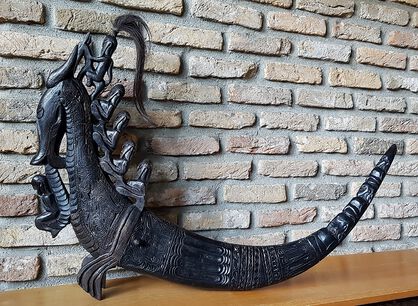Naga Morsarang
| Title | Naga Morsarang |
|---|---|
| Artist | |
| Date | 1950-1960 |
| Size | 65 cm |
| Material | Buffalo horn and wood |
| Remarks | Belonged to an old indonesian man who served the army (KNIL) after WWII. In 1960 he moved to the Netherlands and brought this item with him. |
| Signature | |
| Published | |
| Collection | Private collection |
Naga Morsarang
The Toba Batak people of northern Sumatra are especially notable for the abundance and variety of their ritual arts. In the past, the primary religious figures in Toba Batak society were datu, male religious specialists who acted as intermediaries between the human and supernatural worlds. Much of Toba Batak sacred art centered on the creation and adornment of the paraphernalia used by the datu in ritual contexts such as divination, curing ceremonies, or malevolent magic. The datu employed a variety of containers made of different materials to hold the supernaturally powerful substances used in rituals and other ceremonial contexts.
This vessel, known as a Naga Morsarang (Sahan), consists of the hollow horn of a water buffalo, its outer surface incised with curving foliate designs. The horn's pointed end is carved in the form of one or more seated human figures. The last figure on top sometimes wear a head-decoration made of wild boar hair. The wider, open end is plugged with an elaborate wooden stopper that depicts the Singha, the earth deity Boraspati Ni Tano. It is shaped in the form of a lizard, a motif that occurs on other ritual objects such as divination books with one or more human figures riding on its back. The Singha is the mythological sacred lizard that is supposed to protect the contents of the medicine container, the secret herbs (Pupuk). The human figures on its back may represent the succession of ritual masters who preceded the datu who owned the container. It is also possible that the figures are related to mythical characters portrayed on other ritual implements.
In the manufacturing process, Naga Morsarang carving requires precision and care because the carved ornaments, which are also called gorga , contain sacred meanings. By only using a knife and hammer to make detailed carvings, it certainly takes experience to make them. Therefore, not everyone can carve ornaments on a Naga Morsarang . Naga Morsarang craftsmen are now starting to decrease. Now Naga Morsarang is a traditional art work left by ancestors which is considered to have high artistic value. The more difficult and detailed the carving, the higher the artistic value.
Gallery
More info
Wikipedia - Naga Morsarang
Wikipedia - Pupuk
Wikipedia - Tunggal Panaluan
Between mind and soul - Pustaha Manuscripts in Batak Society







